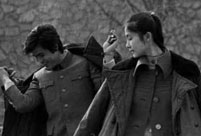TOKYO, Dec. 17 -- Forget about Abenomics! Watch out, "Abe-military" is making its debut.
Led by nationalist Prime Minister Shinzo Abe, the Japanese government approved its first national security strategy Tuesday. Based on it, new defense program guidelines and a mid-term defense buildup plan were adopted.
Setting the tone for Japan's security policy and military buildup in the next five to 10 years, the security package is considered a turning point in Tokyo's understanding of security and a signal that the dangerous "Abe-military" has come on stage.
In its foreword, the strategy claims that "Japan has consistently followed the path of a peace-loving nation since the end of World War II. It has adhered to a basic policy of maintaining an exclusively national defense-oriented policy, not becoming a military power that poses a threat to other countries."
But the contents, brimming with aggressive hints, are totally the opposite.
To conceal Japan's wild ambition of becoming a military power, Abe tailored for his security scheme a phony coat in describing his plan as becoming a "proactive contributor to peace."
However, in his context, the key word is obviously not "peace" but "proactive." In military terms, being "proactive" means acting proactively or even making preemptive strikes. And, absurdly, it is with these notions that Abe proposes to work more actively to ensure peace, stability and prosperity in the world, the Asia-Pacific region and his own country.
While the question of how these documents help make the world safer leaves everyone at a loss, it is crystal clear they see off Japan on its way away from "exclusively national defense-oriented policy."
When talking about strengthening the Japan-U.S. alliance, the documents propose to realize the two countries' "seamless defense," meaning Japan may use "assisting the U.S. army" as an excuse to break the limitation on its activities under its collective self-defense right.
Also, the documents say Japan will help other Asia-Pacific countries to boost their defense capabilities. Therefore, it may set new guidelines on arms exports and leave the restrictions of the "Three Principles on Arms Exports" existing only in name.
Under the principles that Japan adopted in 1967, the country is prohibited from selling weapons to communist states, countries subject to embargoes under UN resolutions, and those engaged in international conflicts.
Even worse, the Abe administration fabricated a "China threat" in these documents to justify its audacious military ambitions.
But anyone with knowledge of recent developments knows it is Japan that stirred up the rising tension with China and is posing a threat to regional peace and stability by leaning to militarism.
While Tokyo says in the new security documents its "peaceful" road has won praise and respect internationally, the rest of the world will watch closely to see how "Abe-military" makes Japan more peace-loving, rather than self-deceiving.
 Heavy cargo flights taking off
Heavy cargo flights taking off In pictures: PLA's digital equipment
In pictures: PLA's digital equipment  Americans mark Thanksgiving Day with parades
Americans mark Thanksgiving Day with parades Love searching stories in cities
Love searching stories in cities  Shanghai shrouded in heavy fog
Shanghai shrouded in heavy fog Office ladies receive ‘devil’ training in mud
Office ladies receive ‘devil’ training in mud Changes in Chinese dancing culture
Changes in Chinese dancing culture  Highlight of Mr Bodybuilding and Miss Bikini Contest
Highlight of Mr Bodybuilding and Miss Bikini Contest  Picturesque scenery of Huanglong, NW China
Picturesque scenery of Huanglong, NW China 17th joint patrol of Mekong River to start
17th joint patrol of Mekong River to start The islands where immortals lived
The islands where immortals lived Snowstorms cause chaos for travelers
Snowstorms cause chaos for travelers Special police detachment of Hefei
Special police detachment of Hefei  Weekly Sports Photos
Weekly Sports Photos China's moon rover, lander
China's moon rover, landerDay|Week|Month